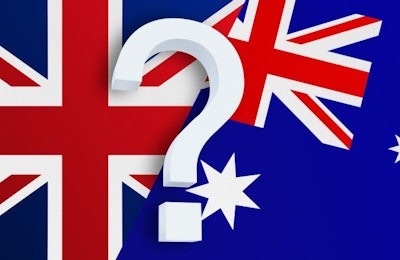
Ahead of negotiations to establish a free trade agreement (FTA) between the United Kingdom (U.K.) and Australia, at first sight, there appears to be a wide gap between the two parties in their prioritization of farming interests.
For Australia, a top priority for the FTA negotiations is securing benefits for its agriculture sector. Already, the country exports around two-thirds of its production.
The ambition of the federal government’s trade minister to build on that export growth has been welcomed by Australia’s farming organization, the National Farmers’ Federation (NFF).
NFF president Fiona Simson has praised the Australian government’s approach, which focuses on the interests of its farmers. In particular, the country’s negotiators are seeking the removal — wherever possible — of trade restrictions. This includes the lifting of tariffs, quotas, and non-tariff barriers.
For the U.K., trade in agricultural products has not been specifically mentioned ahead of the start of the talks on June 29.
Representing the farming sector, the National Farmers’ Union (NFU) has called for fairness in negotiations with future trade partners.
“All we are asking for is fair terms of trade that do not undermine our farmers,” said NFU president Minette Batters. Supported by a petition to maintain food standards endorsed by more than one million people, she denied allegations that the NFU is following a policy of protectionism for its members.
U.K. government position
For the U.K., sectors expected to benefit first from the removal of trade barriers with Australia are drinks companies, the automotive industry, and professional services firms.
With trade last year valued at GBP21 billion (US$26 billion), the two nations are already strong trading partners, according to the U.K.’s Department for International Trade (DIT).
“Ambitious, wide-ranging free trade agreements with old friends like Australia and New Zealand are a powerful way for us to do that and make good on the promise of Brexit,” said International Trade Secretary Liz Truss.
For U.K. negotiators, key principles include the maintenance of high standards and protections for the country’s consumers and workers. Building on existing international obligations, there will be no compromises on the current high levels of environmental protection, animal welfare, and food safety standards, according to the DIT.
Common ground, opportunities
Despite the apparent discrepancies between the two parties over the prioritization of agriculture, there is much common ground.
Trade ties between the two countries are already strong, according to Simson. Until joining the European Union (EU) in 1973, the U.K. was Australia’s largest export market for agricultural products.
“We know that what’s important to Australians in terms of how our food and fiber is produced, is also important to the people of the United Kingdom,” she said. “Our standards in relation to animal welfare, food safety, labor, and the environment are exemplary, and are tailor-made to suit the unique circumstances of Australian agriculture.”
For both countries, expanding free and open trade will help businesses overcome the economic challenges of the coronavirus COVID-19 pandemic, according to the DIT.
Looking further ahead, the U.K. sees the FTA talks with Australia and New Zealand as a logical step towards membership of the Comprehensive and Progressive Agreement for Trans-Pacific Partnership (CPTPP). One of the world’s largest free trade areas, CPTPP accounted for 13% of global GDP in 2018. Australia and New Zealand are already members of this group.

















